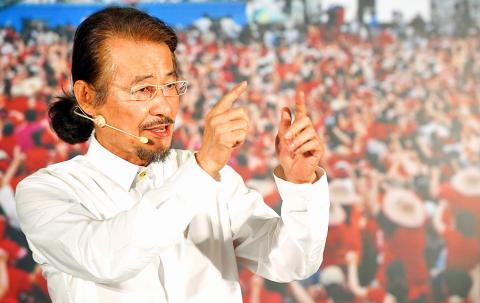Long-time political activist Shih Ming-te (施明德) yesterday announced his presidential bid, saying that he aimed to bring about cross-strait reconciliation and implement social justice, while lashing out at “conventional” politicians who he said had betrayed the public.
“In each successive administration, we see politicians betraying their ideologies, tearing the nation apart and losing direction,” Shih, a founding member of the Democratic Progressive Party (DPP), who broke ties with the party in 2000, told a news conference in Taipei yesterday morning. “There is no leadership in Taiwan, just decisions based on the interaction of power and interests, and the public no longer has any expectations of a new dawn.”
“Along the path of revolution, I have made narrow escapes from the dictator’s knife, and eventually, I knew I would have to engage in a duel with these dirty politicians,” Shih said.

Photo: Wang Min-wei, Taipei Times
He promised that, once elected, he would work to bring about reconciliation between the nation’s political parties, as well as between Taiwan and China; he also vowed to realize social justice and put an immediate end to government corruption.
He called for both the Republic of China (ROC) and the People’s Republic of China (PRC) to work together to form a political entity under what he described as a “larger one China” framework, adding that developments in the cross-strait relationship should be based on the reality that the ROC and the PRC are separate political entities.
“The definition of ‘one China’ has been made too narrow, and in reality it is just taken to mean the PRC,” Shih said. “This is something that the 23 million people of the ROC cannot accept, and I propose to replace it with the ‘larger one China’ framework to bring about reconciliation.”
Under the “larger one China” framework, Shih said, the ROC and the PRC would cease being rivals, and would promise not to take military action against each other, while each side would enjoy the right to take part in international organizations and to establish diplomatic ties with other nations.
Shih said he would assign posts in the central government and the state-run businesses to candidates from the Chinese Nationalist Party (KMT), the Democratic Progressive Party, elites and people under 39.
“My idea is to put an end to the one-party regime or one-party presidential system, and make the president a truly national president,” Shih said.
He went on to say that he would also seek to modernize the legal system in Taiwan, as most of the laws framed in China by the KMT regime 70 years ago.
However, Shih said that it could take a long time to reform the laws, therefore, he proposed creating legal reform committees overseen by the president, with the participation of progressive civic groups.
“When we have finished the law amendment proposals, we would bypass the malicious Legislative Yuan and put the proposals to direct referendums to allow the public to decide whether to put them into effect,” Shih said.
He said he deliberately picked yesterday to announce his presidential bid because it marked the date on which he was released from prison for the last time 25 years ago.

A preclearance service to facilitate entry for people traveling to select airports in Japan would be available from Thursday next week to Feb. 25 at Taiwan Taoyuan International Airport, Taoyuan International Airport Corp (TIAC) said on Tuesday. The service was first made available to Taiwanese travelers throughout the winter vacation of 2024 and during the Lunar New Year holiday. In addition to flights to the Japanese cities of Hakodate, Asahikawa, Akita, Sendai, Niigata, Okayama, Takamatsu, Kumamoto and Kagoshima, the service would be available to travelers to Kobe and Oita. The service can be accessed by passengers of 15 flight routes operated by

Alain Robert, known as the "French Spider-Man," praised Alex Honnold as exceptionally well-prepared after the US climber completed a free solo ascent of Taipei 101 yesterday. Robert said Honnold's ascent of the 508m-tall skyscraper in just more than one-and-a-half hours without using safety ropes or equipment was a remarkable achievement. "This is my life," he said in an interview conducted in French, adding that he liked the feeling of being "on the edge of danger." The 63-year-old Frenchman climbed Taipei 101 using ropes in December 2004, taking about four hours to reach the top. On a one-to-10 scale of difficulty, Robert said Taipei 101

Taiwanese and US defense groups are collaborating to introduce deployable, semi-autonomous manufacturing systems for drones and components in a boost to the nation’s supply chain resilience. Taiwan’s G-Tech Optroelectronics Corp subsidiary GTOC and the US’ Aerkomm Inc on Friday announced an agreement with fellow US-based Firestorm Lab to adopt the latter’s xCell, a technology featuring 3D printers fitted in 6.1m container units. The systems enable aerial platforms and parts to be produced in high volumes from dispersed nodes capable of rapid redeployment, to minimize the risk of enemy strikes and to meet field requirements, they said. Firestorm chief technology officer Ian Muceus said

MORE FALL: An investigation into one of Xi’s key cronies, part of a broader ‘anti-corruption’ drive, indicates that he might have a deep distrust in the military, an expert said China’s latest military purge underscores systemic risks in its shift from collective leadership to sole rule under Chinese President Xi Jinping (習近平), and could disrupt its chain of command and military capabilities, a national security official said yesterday. If decisionmaking within the Chinese Communist Party has become “irrational” under one-man rule, the Taiwan Strait and the regional situation must be approached with extreme caution, given unforeseen risks, they added. The anonymous official made the remarks as China’s Central Military Commission Vice Chairman Zhang Youxia (張又俠) and Joint Staff Department Chief of Staff Liu Zhenli (劉振立) were reportedly being investigated for suspected “serious